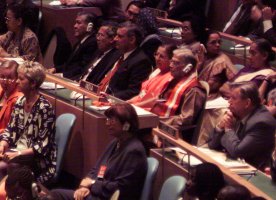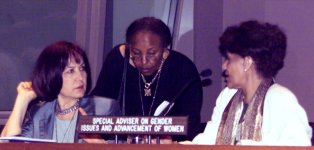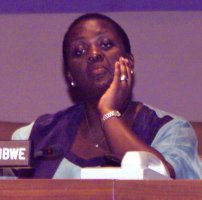 |
 |
 UN
Secretary-General Kofi Annan welcomed all participants and highlighted
progress since Beijing, including the record number of women leaders
and decision-makers in the UN system, greater understanding that women's
equality is a prerequisite for development, and an increase in legislation
addressing violence against women. He noted that much work remains
on issues such as the economic divide between genders and violence
against women in new types of armed conflict that target civilian
populations. He emphasized the spread of HIV/AIDS and the trafficking
of women as challenges that require immediate action.
UN
Secretary-General Kofi Annan welcomed all participants and highlighted
progress since Beijing, including the record number of women leaders
and decision-makers in the UN system, greater understanding that women's
equality is a prerequisite for development, and an increase in legislation
addressing violence against women. He noted that much work remains
on issues such as the economic divide between genders and violence
against women in new types of armed conflict that target civilian
populations. He emphasized the spread of HIV/AIDS and the trafficking
of women as challenges that require immediate action. |
| A
minute of silent prayer |
|
|
PrepCom
Chair Christine Kapalata (Tanzania)
called for the full implementation of the PFA, stating that it should
be matched with financial resources such as ODA. She highlighted the
importance of political will and responsible political decisions as
delegations conclude negotiations. |
|
Delegates
in the in the General Assembly during the morning session
|
 |
 |
Yakin
Ertürk, Director, Division for the Advancement of Women (left)
and Angela King, Special Adviser on Gender Issues and the Advancement
of Women (right) in the Committee of the Whole. The COW then
heard a brief general debate to accommodate speakers unable to address
the Plenary. Speakers included SADC, UNAIDS, the WFP, the IMF, the
UN International Research and Training Institute for the Advancement
of Women, FAO, the ILO, the Office of Drug Control and Crime Prevention,
UNESCO, the All India Women's Conference, and the Economic and Social
Commission for Western Asia. The Working Groups began their
work in the afternoon. |
| Panel
Discussions: "Contribution
of the Microcredit Summit Campaign to the Platform for Action"
organized by UNIFEM, ILO and the Microcredit Summit Campaign |
| Microcredit: Much More Than Money: Panelists
included Hillary Rodham Clinton, First Lady of the US, Ela Bhatt,
SEWA (Self-Employed Women's Association), Prof. Muhammad Yunus, Founder
of the Grameen Bank, Chief Bisi Ogunleye (Founder of Country Women
Association of Nigeria), Sam Daley-Harris, Director of Microcredit
Summit Campaign, Mark Malloch Brown, UNDP Administrator. Noeleen Heyzer,
Executive Director of UNIFEM, moderated the panel. |
 Hillary
Rodham Clinton, First Lady of the US, recalled the universal goal
of recognition of women's rights as human rights and noted improved
national legislation since Beijing, thereby creating tools to punish
human rights violations. Ms. Clinton highlighted the linkages between
gender equality and social and economic development and highlighted
US financial and technical support to women around the world to help
build civil societies and peace. She emphasized the importance of
microcredit in converting women's efforts into entrepreneurship. She
further called for an international crusade to curb the feminization
of AIDS and underscored that women trafficking is one of the most
serious current human rights violations.
Hillary
Rodham Clinton, First Lady of the US, recalled the universal goal
of recognition of women's rights as human rights and noted improved
national legislation since Beijing, thereby creating tools to punish
human rights violations. Ms. Clinton highlighted the linkages between
gender equality and social and economic development and highlighted
US financial and technical support to women around the world to help
build civil societies and peace. She emphasized the importance of
microcredit in converting women's efforts into entrepreneurship. She
further called for an international crusade to curb the feminization
of AIDS and underscored that women trafficking is one of the most
serious current human rights violations. |
 Following
Hillary Clinton's speech, participants sang We Shall Overcome
Photo: Muhammad Yunus, Founder of Grameen Bank, Bangladesh, Noeleen
Heyzer, UNIFEM Executive Director, and Hillary Clinton
Following
Hillary Clinton's speech, participants sang We Shall Overcome
Photo: Muhammad Yunus, Founder of Grameen Bank, Bangladesh, Noeleen
Heyzer, UNIFEM Executive Director, and Hillary Clinton
Noeleen
Heyzer, Executive Director of UNIFEM, highlighted two factors
in the campaign for microcredit: commitment and courage. She noted
that: women have a low credit risk with high rates of repayment;
microcredit is an essential ingredient for building local organization;
and many microcredit groups are sites for empowerment. She called
for: a culture of economic enterprises among women; participation
in women-friendly markets; structures and rules that women can
organize and operate; improvements to women's bargaining power;
a greater role for women in shaping policies and institutions;
and reduced risk for women through insurance. Prof. Muhammad
Yunus, Founder of the Grameen Bank, outlined progress in Bangladesh
through his organization and other microcredit initiatives. He
stated that the people's coping capacity for disasters such as
the floods of 1998 was reinforced through microcredit, and noted
increases in women's participation in local politics. He identified
successful ventures such as a phone, solar energy and communication
companies.
|
Mark
Malloch Brown, UNDP Administrator (left),
said the definition of democracy had broadened since Beijing and
the rights of the poorest women had improved. He welcomed technological
and financial transformations and anticipated that the use of
the Internet and related-low transaction costs would bring a revolutionary
expansion of microcredit to remote areas. Sam Daley-Harris,
Director of Microcredit Summit Campaign (center), reported
that over 6 million poor people had received microcredit since
the Beijing Conference and emphasized the sustainable value of
microcredit. He deplored the lack of effective means to identify
and motivate the poorest and to render credit institutions self-sufficient.
Ela
Bhatt, SEWA (Self-employed Women's Association) (right),
stated that women's banking is freedom and power, and highlighted
future challenges of microcredit, including: moving from microcredit
to microfinance, such as savings, inflation protection and insurance
services; getting mainstream banks to treat microfinance as an
alternative business line through, for example, deregulation of
interest rates on small loans; and recognition of the important
role of the informal sector in national economies.
|
|
Chief
Bisi Ogunleye (Founder of Country Women Association of Nigeria)
highlighted the importance and success of linking traditional
forms of savings and credit schemes in Africa to microcredit strategies.
She described the "three-legged empowerment approach", which incorporates
economic, social and political empowerment, such as through African
Traditional Responsive Banking and the Women's Political Participation
Forum.
|
|
Panel Discussion: Progress of the World's
Women
|
 Diane
Elson, UNIFEM Coordinator (above right), made
a presentation of the new biennial UNIFEM report on Progress of the
World's Women 2000. Valerie Amos, Spokesperson on Women's and International
Development Issues for the UK Government (above left), underscored
the importance of, inter alia, international development and
the elimination of poverty, solid targets to give a clear sense of
purpose, and access of the poor and women to the benefits of globalization.
Other panelists included: Dr. Speciosa Wandira Kazibwe, Vice-President
of Uganda (pictured on right), E.L. Herfkens, Minster for Development
Cooperation, Netherlands, Benedita da Silva, Vice-Governor, State
of Rio de Janeiro, Brazil, and Gita Sen, Professor, Indian Institute
for Management, India Diane
Elson, UNIFEM Coordinator (above right), made
a presentation of the new biennial UNIFEM report on Progress of the
World's Women 2000. Valerie Amos, Spokesperson on Women's and International
Development Issues for the UK Government (above left), underscored
the importance of, inter alia, international development and
the elimination of poverty, solid targets to give a clear sense of
purpose, and access of the poor and women to the benefits of globalization.
Other panelists included: Dr. Speciosa Wandira Kazibwe, Vice-President
of Uganda (pictured on right), E.L. Herfkens, Minster for Development
Cooperation, Netherlands, Benedita da Silva, Vice-Governor, State
of Rio de Janeiro, Brazil, and Gita Sen, Professor, Indian Institute
for Management, India |

 ENB Summary of CSW-44 and the Informal
Consultations
ENB Summary of CSW-44 and the Informal
Consultations
 Linkages FWCW page
Linkages FWCW page
 UN Division for the Advancement of Women Beijing +5 Site with official
documents and information
for participants
UN Division for the Advancement of Women Beijing +5 Site with official
documents and information
for participants
 Special
Events during the Special Session
Special
Events during the Special Session

|